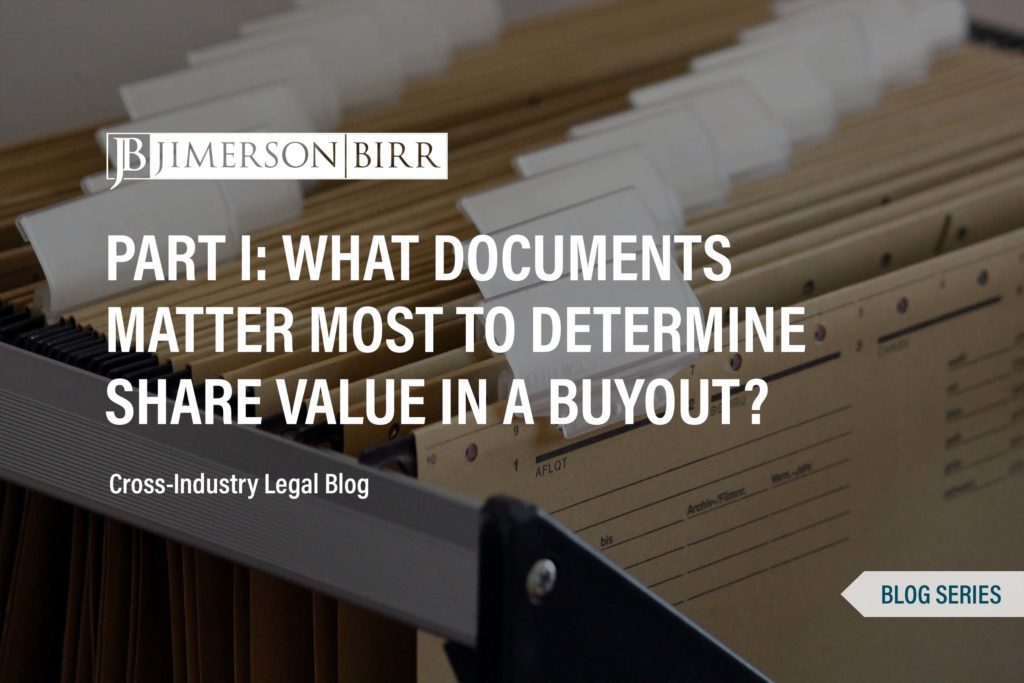Different situations can lead to a corporate buyout. As a business move, a majority shareholder may seek to buyout the minority shareholders, or one company may seek to acquire a majority of another company’s shares. Buyouts may also be contractually forced under a company’s governing documents or legally forced by courts pursuant to a statute. In the context of a forced buyout, if parties cannot agree to the share value, the court may have to make a determination as to the fair value of the shares. If the court is forced to make a determination of share value, the parties must provide competent, substantial evidence on which the court can make a determination. See Tucker v. Tucker, 171 So.3d 158 (Fla. 4th DCA 2015); Dolan v. Springlight Bottled Water Corp., 656 So. 2d 211 (Fla. 3d DCA 1995).
Whether the buyout is a product of a business decision or a court order, determining share value is an obligatory step precedent to the buyout. You must not only consider the company’s current financial situation, but also its financial history and future financial potential. This post is the first in a series of three posts that aim to provide an overview of the most important documents for evaluating an entity’s financial past, present, and future.
This post, Part 1, will provide an overview of the most important documents for evaluating a company’s financial history in preparation for determining the company’s share value in a buyout.
Why Is a Company’s Financial History Relevant to Determining Share Value in a Buyout?
Looking at a company’s financial history can paint a picture of how the company has performed and grown in the time proceeding the valuation date of the buyout. Not only does a company’s financial history provide insight into the company’s performance and growth, but it also may reveal information about the tendencies and decision-making processes of the company that can be useful in analyzing the company’s future prospects.
What are the Most Important Documents for Evaluating a Company’s Financial History?
Many of the documents you will need to evaluate a company’s financial history in advance of determining share value will come from the five years preceding the valuation date. To learn about the company’s financial history, you should request, at a minimum, the following documents:
- Complete accrual basis financial statements for the five fiscal years preceding the valuation date, including balance sheets, profit and loss statements, cash flow statements, and notes to financial statements
- Year-to-date interim financial statements through the valuation date
- Company income tax returns for the five years preceding the valuation date
- Detailed general ledger for the five years preceding the valuation date
- Monthly sales by customer and product for the five years preceding the valuation date
- Key personnel compensation schedule for the five years preceding the valuation date, including benefits and personal expenses paid by the company
- Any appraisals on equipment, furniture, or real estate in the Company during the five years preceding the valuation date
- Any appraisals of the company’s stock, or other ownership, performed over the five years preceding the valuation date, including any offers to purchase or sell any or all of the company’s stock
- Articles of incorporation, bylaws, and amendments to either
- Information on prior transactions in the stock or any related party transactions during the five years preceding the valuation date
- Brief history of the company and description of the business and its products/services, including position relative to competition and any factors that make the business unique
Why Are These Documents Important for Determining Share Value in a Buyout?
Financial statements for the years preceding the valuation date will provide valuable information regarding the company’s assets, liabilities, and cash flow and how those have fluctuated over the years. Documented appraisals of the company’s tangible assets such as equipment and real estate, as well as appraisals of its stock and ownership will show how those items either gained or lost value in the years preceding the valuation date. All of this information will reveal how the company has gotten to where it is at the valuation date, and aid in predicting how the company will continue to perform after the valuation date.
Other documents, such as the company’s articles of incorporation, bylaws, and shareholders’ agreements will reveal the rules under which the company conducts its business and any rules that the directors, officers, and shareholders must follow. A brief history of the company and description of its business will also help you understand the purpose of the company and how likely it is to remain successful in the future. These rules and background information will help you understand how the company got to where it currently is and provide a basis for predicting whether it can succeed in the future.
What’s Next?
Continue on to Parts 2 and 3 of this series to learn more about which documents are most important for understanding a company’s current financial status and future potential in relation to determining share value in a buyout.

